Related Research Articles
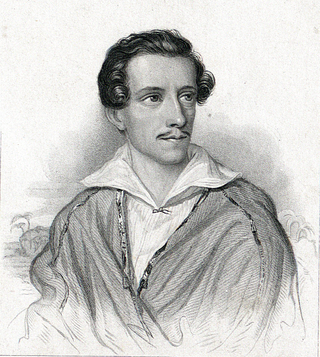
Juliusz Słowacki was a Polish Romantic poet. He is considered one of the "Three Bards" of Polish literature — a major figure in the Polish Romantic period, and the father of modern Polish drama. His works often feature elements of Slavic pagan traditions, Polish history, mysticism and orientalism. His style includes the employment of neologisms and irony. His primary genre was the drama, but he also wrote lyric poetry. His most popular works include the dramas Kordian and Balladyna and the poems Beniowski, Testament mój and Anhelli.
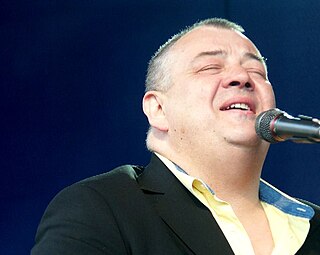
Stanisław Joachim Sojka, also known as Stanisław Soyka, is a Polish jazz and pop singer, pianist and composer.

Jan Feliks Szyszko (help·info) was a Polish forester, university teacher and politician who served as Minister of Environment in the cabinets of Jerzy Buzek (1997–1999), Kazimierz Marcinkiewicz (2005–2007), Jarosław Kaczyński (2007), Beata Szydło (2015–2017) and Mateusz Morawiecki (2017–2018).
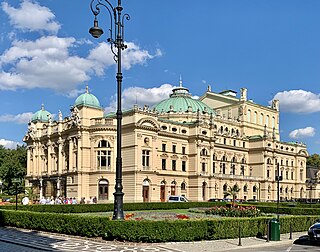
Juliusz Słowacki Theatre is a 19th-century Eclectic theatre-opera house in the heart of Kraków, Poland, and a UNESCO World Heritage Site. Erected in 1893, it was modeled after some of the best European Baroque and Eclectic theatres such as the Palais Garnier in Paris. The theatre was named after Polish poet Juliusz Słowacki in 1909 and in 1978 was inscribed alongside the Historic Centre of Kraków into the World Heritage Register.

Wojciech Korneli Stattler or Albert Kornel Stattler was a Polish Romantic painter of Swiss aristocratic ancestry, who started training in Vienna and at age 17 went to St. Luke's Academy in Rome. From 1831 he taught as professor at the School of Fine Arts in Kraków. 1850 he returned to Rome. His most famous pupil was Poland's leading painter of historical figures and events, Jan Matejko.
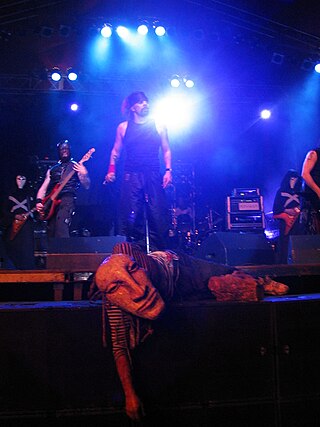
Sweet Noise is a Polish alternative metal band. The group was formed in 1990 in Swarzędz. They have released eight CDs and appeared three times at the Przystanek Woodstock festival with the special show in 2003 when more than 400,000 people watched the culmination of what the band refers to as conceptual art of Revolta White Shock. The leader and creator of the band is Peter "Glaca" Mohamed. Mohamed is the singer, musician, performer, producer and conceptual artist. He developed an experimental, multimedia project Noise Inc.. He is also involved in project Serce with Toshi Kasai and M.T.void which is a musical outfit run by Mohamed and Justin Chancellor, the bass player of Tool.

Warner Music Poland Sp. z o.o., is a Polish subsidiary of Warner Music Group, it was founded in 1994 in Warsaw. The label's CEO is Piotr Kabaj.

Marian Kociniak was a Polish film and theatre actor, most notable for appearing in the 1970 film How I Unleashed World War II.

Edmund Janniger was a short-time adviser to the Minister of National Defence of Poland Antoni Macierewicz in late 2015. Then 19, he was the youngest ministerial adviser in Poland’s history.

Possession of most drugs for recreational use, including cannabis, is illegal in Poland. It was classified as a narcotic in 1951 but it was not until 1997 that possession and use of the drug became a crime. Since 2011, prosecutors have the discretion to drop the charges if the quantity of drugs seized is only a small amount. The medical use of cannabis was legalized in 2018.

The United Right is a conservative political alliance in Poland. It came to power following the 2015 parliamentary election.

The European Coalition was a short-lived political alliance and electoral list in Poland. It was established in 2019 by a group of former prime ministers and former foreign ministers, including Jerzy Buzek, Ewa Kopacz, Grzegorz Schetyna and Radosław Sikorski. They declared the will to construct "one broad list in European Parliament election, the aim of which would be to restore Poland's strong position in the European Union". The Coalition is to be pro-European and centrist.
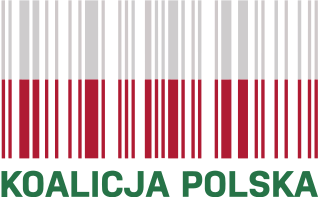
The Polish Coalition is a political alliance in Poland. It is led by the Polish People's Party.
Paweł Sękowski is a Polish historian specializing in modern history, researcher at the Jagiellonian University, President of the Kuźnica Association from January 2018.

Dziennik Telewizyjny, commonly simplified to Dziennik, was the chief news program of Telewizja Polska between 1958 and 1989, in the Polish People's Republic. It was Poland's second regularly televised newscast and the primary propaganda tool used by the Polish United Workers' Party during the Cold War. The final episode aired on 17 November 1989 and the program was replaced by Wiadomości on the following day, 18 November 1989.

Łukasz Jan Szumowski is a Polish cardiologist who served as Minister of Health from 2018 to 2020. He is also a member of the IX Sejm, representing the Płock constituency, elected from the lists of Law and Justice.
Szymon Hołownia's Poland 2050 is a centrist political party in Poland.

Anita Gargas Wojciechowska is a Polish journalist specialising in investigative journalism and a mathematician by education. She is a journalist of the weekly Gazeta Polska and the daily Gazeta Polska Codziennie, where she is the head of the investigative section. From 1 August 2006 to 19 February 2010, she was a deputy director of the news desk and the vice-director for journalism at TVP1, and the author of the programme Misja specjalna.
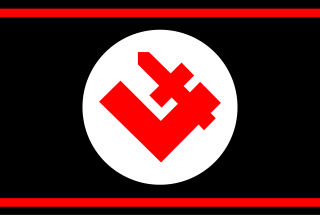
Falanga is a Polish national radical organization founded in January 2009. The former coordinator of the Masovian Brigade of the National Radical Camp (ONR), Bartosz Bekier, leads it.
Marian Kałuski - Polish-Australian journalist, writer, historian and traveler.
References
- ↑ "Polskie Cedry Wydanie Specjalne - Polacy W Libanie Przed I Wojną Światowa - Juliusz Słowacki I O.maksymilian Ryłło". Archived from the original on January 5, 2009. Retrieved October 20, 2014.
- ↑ "Polskie Cedry Wydanie Specjalne - Polacy W Libanie Przed I Wojną Światowa - Juliusz Słowacki I O.maksymilian Ryłło". Archived from the original on January 5, 2009. Retrieved October 20, 2014.
- ↑ "Polskie Cedry Wydanie Specjalne - Polacy W Libanie Przed I Wojną Światowa - Juliusz Słowacki I O.maksymilian Ryłło". Archived from the original on January 5, 2009. Retrieved October 20, 2014.
- ↑ "Polskie Cedry Wydanie Specjalne - Polacy W Libanie Przed I Wojną Światowa - Juliusz Słowacki I O.maksymilian Ryłło". Archived from the original on January 5, 2009. Retrieved October 20, 2014.
- ↑ Grupa Wirtualna Polska. "Polonia - Najnowsze informacje". wiadomosci.wp.pl. Retrieved 20 October 2014.
- ↑ Grupa Wirtualna Polska. "Polonia - Najnowsze informacje". wiadomosci.wp.pl. Retrieved 20 October 2014.
- ↑ "Polskie Cedry Wydanie Specjalne - Polski Exodus Na Bliski Wschód". Archived from the original on January 5, 2009. Retrieved October 20, 2014.
- ↑ "Wiadomości - Gazeta.pl". gazetapl. Retrieved 20 October 2014.
- ↑ "Wiadomości - Gazeta.pl". gazetapl. Retrieved 20 October 2014.